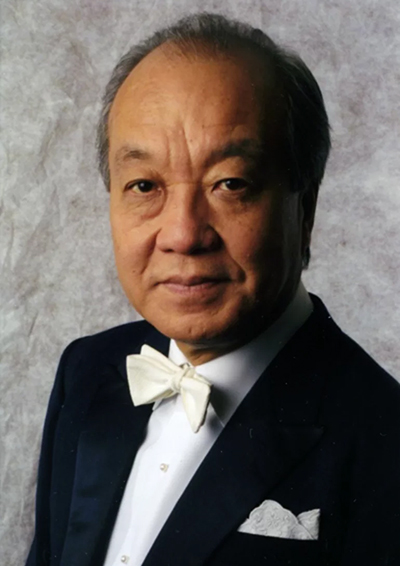Yuzo Toyama

Born: May 10, 1931, Tokyo, Japan
Died: July 11, 2023, Nagano, Japan
Rhapsody for Orchestra
- Composed: 1960, revised in 2001
- Premiere: August 1960 in Tokyo by the NHK Symphony Orchestra, Hiroyuki Iwaki conducting
- CSO Notable Performances: These are the CSO’s first performances of this work.
- Instrumentation: 2 flutes (incl. piccolo), piccolo, 2 oboes, 2 clarinets, 2 bassoons, 4 horns, 3 trumpets, 3 trombones, tuba, timpani, bass drum, bongo, chan-chiki, claves, Japanese bells, Japanese drums, sistro, snare drum, wood block, harp, strings
- Duration: approx. 7 minutes
Yuzo Toyama was a leading musical figure in the history of post-World War II Japan. Born in Tokyo in 1930, Toyama began his composition studies at the Tokyo Music School with Kan’ichi Shimofusa, who had studied with Paul Hindemith in Berlin and introduced European stylistic elements into his compositions. In 1953, the year after Toyama graduated from the school, he helped found the group Yagi no Kai to promote Japanese music; a year later he was appointed an apprentice conductor with the NHK Symphony Orchestra. From 1958 to 1960, Toyama studied composition and conducting in Vienna and participated in masterclasses in Salzburg with the eminent Austrian-born American conductor Erich Leinsdorf. Toyama rejoined the NHK Symphony Orchestra as assistant conductor upon his return home and went on to conduct all of the country’s major orchestras and hold important posts with orchestras in Osaka, Nagoya and Sendai. His many works—operas, ballets, symphonies, concertos, large choral compositions, numerous chamber pieces—melded the influences of Hindemith, Shostakovich, Bartók, Kodály and other 20th-century European composers with traditional Japanese melodies, idioms and instruments. Toyama received numerous awards for his contributions to Japanese musical life, including the 1982 Suntory Music Award, the country’s most prestigious musical honor.
Toyama composed Rhapsody for Orchestra, his best-known work, as an encore for the 1960 around-the world tour of the NHK Symphony Orchestra, which began on August 29 in India and ended in the United States on November 4 after visiting 24 cities in 12 countries. Toyama and Hiroyuki Iwaki shared the conducting duties; Iwaki led the premiere of Rhapsody at the send-off concert in Tokyo. For the Naxos recording of the work by the Tokyo Metropolitan Symphony Orchestra, conducted by Ryusuke Numajiri, Japanese musicologist Morihide Katayama wrote, “Rhapsody starts off with repeated claps of hyoshigi, a pair of woodblocks that are used in the Kabuki theater. A series of well-known Japanese folk-songs follows: a children’s song, 'Antagata dokosa,' appears on the trumpet; a fishermen’s work song from Hokkaido, 'Soran-bushi,' is heard in the brass; a banquet song from Kyushu, 'Tankou-bushi,' is presented by the strings; and another banquet song, 'Kushimoto-bushi' from the Kansai area, is played on the flute. A pack-horse driver’s song, 'Oiwake-bushi' from the highlands of central Japan played softly on the flute, constitutes the middle part of the work, and 'Yagi-bushi,' a festival song from Kanto, provides a fervent ending.”
—Dr. Richard E. Rodda